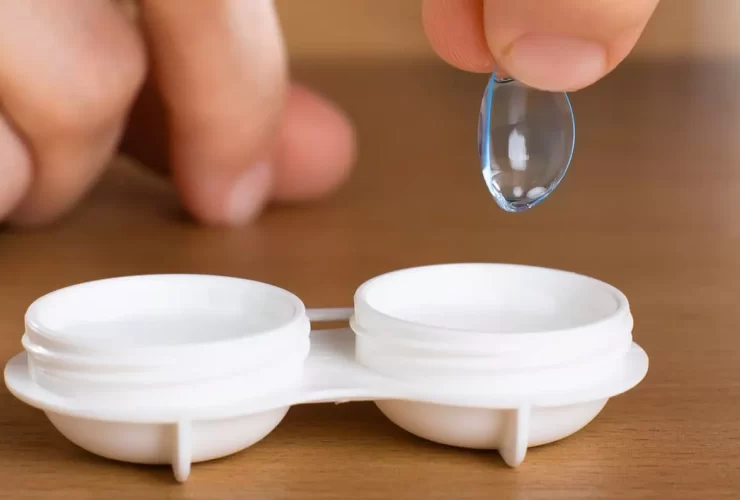Farsightedness, also called hyperopia, is a common refractive error that causes nearby objects to appear blurry while distant objects remain clearer. It’s a type of vision problem that impacts how the human eye focuses light onto the retina. At Modern Vision Solutions, we help patients understand whether a contact lens or another corrective lens is the right option for their specific needs. This includes evaluating your eye health, prescription, and lifestyle. Schedule an appointment with our optometry team to see if contact lenses can help you see clearly at every distance.
Can you wear contact lenses for farsightedness?
Yes, people with farsightedness can wear contact lenses to correct their vision. Contact lenses are a widely used solution for correcting far-sightedness by improving how light is focused through the cornea and onto the retina. At Modern Vision Solutions, we offer several types of lenses that suit different degrees of hyperopia and account for variations in eye shape, oxygen permeability, and lifestyle needs. Whether you’ve worn glasses for years or are exploring vision correction for the first time, we can help you find a comfortable and effective option tailored to you.
How do contact lenses correct farsightedness?
Contact lenses correct farsightedness by adjusting the way light enters the eye so that it focuses correctly on the retina rather than behind it. In a farsighted eye, the eyeball may be shorter than average, or the cornea may have a flatter shape, causing light to focus too far back in the eye and resulting in blurred vision up close. Modern Vision Solutions provides lenses with a positive (plus) prescription that helps bring nearby objects into focus. These lenses improve visual acuity and reduce eye strain that can occur during activities like reading or watching television. Because the lens sits directly on the eye, it moves with the eye’s natural movement and provides more accurate visual perception than glasses for many patients.
What types of contact lenses are best for farsightedness?
The type of contact lens best suited for farsightedness depends on your eyeglass prescription, corneal topography, and the presence of any additional vision conditions such as astigmatism or presbyopia. For mild to moderate hyperopia, soft spherical lenses are commonly used due to their comfort and flexibility. For those with higher levels of farsightedness, a rigid gas permeable lens may offer sharper vision and greater precision, especially when the eye’s shape requires a more customized fit. Hybrid lenses combine the optical clarity of RGP lenses with the softness of traditional contacts. At Modern Vision Solutions, we also offer multifocal lenses or bifocals for patients who experience age-related vision changes, which allow them to focus clearly at multiple distances without switching between different lenses. All options are reviewed during a comprehensive eye examination to determine the most appropriate fit and material based on your needs and comfort.
What are the benefits of contact lenses over glasses for hyperopia?
While both contact lenses and glasses are effective at correcting refractive errors like hyperopia, contact lenses often provide a more natural field of vision. Glasses can limit peripheral vision and may cause distortion, particularly with high prescriptions. Contact lenses conform to the natural movement of the eye, offering uninterrupted focus and a wider visual field. For patients who lead active lifestyles or need freedom from frames during sports, contacts can be a more convenient choice. However, contacts do require proper hygiene and regular replacement to maintain eye health. At Modern Vision Solutions, we also consider any signs and symptoms you may be experiencing—such as eye strain or headache—to help determine which corrective method supports your long-term visual comfort.
Can children with farsightedness wear contact lenses?
Yes, children can wear contact lenses for farsightedness, depending on their maturity level, ability to handle the lenses responsibly, and overall eye health. Pediatric optometry care at Modern Vision Solutions ensures that any child fitted for lenses undergoes a full eye examination to rule out other eye conditions and assess visual development. For young patients, glasses are often the first approach, but contact lenses may be recommended when visual demands increase, especially during school or sports activities that involve close-up focus and learning. Because children’s eyes are still developing, their lenses may need to be adjusted more frequently to maintain proper focus and prevent complications like retinal detachment or progression into near-sightedness or myopia.
Are contact lenses safe and comfortable for everyday wear?
Modern contact lenses are made from soft plastic materials designed to allow oxygen to pass through to the cornea, which helps maintain eye health during daily wear. At Modern Vision Solutions, we offer lenses with varying levels of stiffness and hardness depending on your tolerance, tear film quality, and sensitivity. While some patients may experience initial discomfort, most adapt quickly and find contacts easier to manage than expected. It’s essential to follow the prescribed cleaning and replacement schedule to prevent infection and avoid issues like corneal irritation. Regular check-ins with our ophthalmology and optometry team allow us to monitor your progress and adjust your lens prescription or material if needed.
What role does corneal topography play in choosing lenses?
Corneal topography is a diagnostic imaging test that maps the surface curvature of the cornea. It’s a critical step in the fitting process at Modern Vision Solutions, especially for patients with irregular eye shapes or high degrees of farsightedness. This mapping helps us identify any abnormalities or patterns that could affect how a lens fits and performs. With this information, we can recommend the appropriate corrective lens—whether it’s a soft lens, a rigid gas permeable lens, or a hybrid option. The better the fit, the better the focus, and the higher the likelihood of maintaining clear and stable vision throughout the day.
Can contact lenses be combined with other treatments for farsightedness?
Yes, contact lenses can be part of a broader treatment plan that includes vision therapy, bifocals, or in some cases, surgical options like LASIK or Refractive Lens Exchange (RLE). While LASIK is not always appropriate for individuals with thin corneas or certain medical conditions, it may be a long-term solution for those who are not satisfied with glasses or contact lenses. At Modern Vision Solutions, we assess whether you might be a candidate for refractive surgery or if your needs are better met with a non-surgical corrective lens. Our goal is to offer solutions that enhance both your visual acuity and your day-to-day comfort.
Take the Next Step Toward Clearer, More Comfortable Vision
Farsightedness doesn’t have to interfere with your ability to read, drive, or enjoy daily life. Whether you’re exploring contact lenses for the first time or looking to upgrade your current corrective lens, Modern Vision Solutions is here to help. With personalized care, advanced diagnostic tools, and a full range of lens options, we make sure your treatment supports your visual perception, comfort, and long-term health. Schedule a consultation today to find out if contact lenses are the right solution for your farsightedness.











